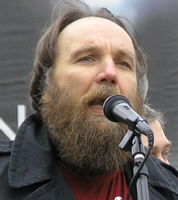The Neo-Eurasianist movement has been a curious feature of the Russian intellectual landscape throughout the post-Soviet years. It is dominated by a single figure, the monk-bearded Aleksandr Dugin, who argues that Russia is not a European country but an Asian one, and advocates a grand alliance with the Turkic and Arab worlds, India, Japan, Iran and even Israel, to counter American influence, which it regards as an existential threat to Russia. Dugin's theories are larded with a significant amount of the occult, are complex and often contradict each other. But their anti-American emphasis and open call for return to empire have resonated in today's Russia, and Dugin appears to carry significant influence. He is a frequent guest on state television, and his International Eurasian Movement's "Higher Council" is full of top political and religious figures, including a deputy speaker of the Russian Senate, the editor of the house magazine of the Russian General Staff and the grand mufti of Russia. Even then-President Vladimir Putin's oft-quoted line that the collapse of the Soviet Union was "the greatest geopolitical catastrophe of the century" was taken straight from Neo-Eurasianist beliefs. As one scholar who has studied Dugin put it, "He is simultaneously on the fringe and at the center of the Russian nationalist phenomenon." The story has recently taken a bizarre and potentially serious turn involving Turkey, one of the Neo-Eurasianists' top potential allies. On trial in Ankara now are dozens of military officers and politicians who are allegedly connected to Turkey's "Deep State" -- the rumored apparatus that controls the country behind the facade of democratic elections -- as part of the secret Ergenekon organization. Prosecutors claim that Ergenekon was engaged in a plot to overthrow the government, and investigators have found large weapons caches.
Russian Neo-Eurasianists and Turkey’s Ergenekon Trial

